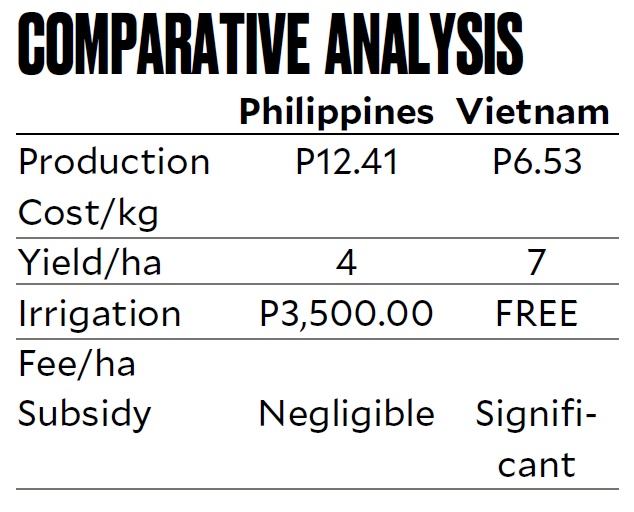Irresponsible rice trade liberalization
A plan to liberalize rice trade, by imposing a 35-percent tariff on the produce, by June next year is definitely irresponsible—and disastrous.
On Oct. 17, this issue was discussed at the Senate hearing on agriculture chaired by Sen. Francis Pangilinan.
The government’s reckless actions when the too rapid agriculture trade liberalization occurred in compliance with the World Trade Organization (WTO) many years ago come to mind. The accompanying safety nets promised by the government were never given.
The latter is a major reason why we have a 40-percent rural poverty rate today, more than double the 19 percent of Vietnam and the 14 percent of Indonesia and Thailand.
Liberalized trade with a low 35 percent tariff will only worsen our poverty situation. Our government is supposed to help farmers, not harm them.
Fair tariff
Article continues after this advertisementOf course, tariff is preferred over quantitative restrictions or cap on imports. But it must be a fair tariff.
Article continues after this advertisementStudies have shown that a rice tariff of 70 percent is appropriate as it will give rice imports equal footing with our produce.
The suggested 35 percent rate is therefore irresponsible.
But if this is the only level acceptable to WTO members, we must then be given at least two years to prepare for this very low rate.
Our government has not prepared our farmers for this. Sadly, our agriculture governance is littered with too many cases of corruption, incompetence and indifference to our farmers’ sad plight.
Consider the table below, created with the help of Dr. Flordeliza Borday.
Farmers want and deserve a fair deal from our government. They have not gotten this. There is gross mismanagement in agriculture governance.
It is irresponsible for our government to subject our rice farmers to a 35-percent tariff as early as June next year, when the government has not delivered its share through providing our farmers a level playing field. The government must deliver this during at least a two-year extension.
This can be done with a clear roadmap with the necessary budget support. We have not seen this yet.
Senator Pangilinan asked government agencies what would happen if the 35-percent tariff would be implemented next year. An Alyansa Agrikultura leader recommended the private sector should be given a chance to submit its own scenarios, with rice farmers and scientists providing the major inputs. This is necessary for the Senate to have a complete view in addressing food security, rural poverty and farmer welfare.
Governance
It is essential that good agriculture governance likewise be addressed. During the hearing, Alyansa Agrikultura cited the lack of a detailed rice roadmap with location—specific plans and budget. An effective management system is also sorely lacking today.
A recent irrigation study cited by UPLB Dean Arnold Elepano showed that with more than an annual National Irrigation Agency budget of P20 billion, 34,000 new irrigated hectares were provided. But 70,000 hectares lost irrigation, resulting in a net deficit of 36,000 hectares. In spite of this, the NIA budget was increased from P28.8 billion last year to P32.7 billion this year, with a proposal for P36.4 billion next year. With governance like this, we can say goodbye to good agriculture prospects.
To use a phrase often said by President Duterte, irresponsible agriculture governance “must stop.” It is unjust for the farmers to suffer for the failings of government. If the farmers cannot get a fair rice tariff in 2017, the government must provide them with a well implemented roadmap with the appropriate budget and management system during at least a two-year postponement of the 35 percent tariff rate. Only then can we say that we have a responsible government that helps, rather than harms, the farmers.
